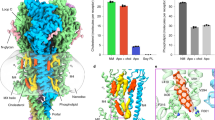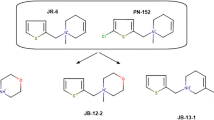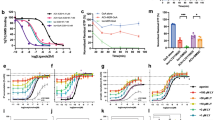Abstract
THE loss of sensitivity of a tissue to an agonist (perhaps a neurotransmitter) after prolonged exposure to this compound is called desensitisation and may be specific1 or nonspecific2. Although many different mechanisms may be involved in nonspecific desensitisation3, specific desensitisation (tachyphylaxis) has long been considered to involve the agonist–receptor complex4–7. Our interest in the interaction of certain psychotropic drugs with muscarinic acetylcholine receptors of cultured nerve cells8,9 has led us to study the desensitisation of these receptors. They mediate the formation of guanosine 3′,5′-cyclic phosphate (cyclic GMP)8–10, a response which has yielded much information about the interactions of agonists and antagonists with the muscarinic receptor8,9, although a direct coupling of this receptor and guanylate cyclase has not been demonstrated. We report here our use of this receptor effect to characterise the specific desensitisation of muscarinic acetylcholine receptors of intact mouse neuroblastoma cells (clone N1E–115).
This is a preview of subscription content, access via your institution
Access options
Subscribe to this journal
Receive 51 print issues and online access
$199.00 per year
only $3.90 per issue
Buy this article
- Purchase on Springer Link
- Instant access to full article PDF
Prices may be subject to local taxes which are calculated during checkout
Similar content being viewed by others
References
Barsoum, G. S. & Gaddum, J. H. J. Physiol., Lond. 85, 1–14 (1935).
Cantoni, G. L. & Eastman, G. J. Pharmac. exp. Ther. 87, 392–399 (1946).
Waud, D. R. Pharmac. Rev. 20, 49–88 (1968).
Thesleff, S. Acta physiol. scand. 34, 218–231 (1955).
Sugiyama, H., Popot, J -L. & Changeux, J.-P. J. molec. Biol. 106, 485–496 (1976).
Mickey, J. V., Tate, R., Mullikin, D. & Lefkowitz, R. J. Molec. Pharmac. 12, 409–419 (1976).
Birdsall, N. J. M. & Hulme, E. C. J. Neurochem. 27, 7–16 (1976).
Richelson, E. Nature 266, 371–373 (1977).
Richelson, E. & Divinetz-Romero, S. Biol. Psychiat. 12, 771–785 (1977).
Matsuzawa, H. & Nirenberg, M. Proc. natn. Acad. Sci. U.S.A. 72, 3472–3476 (1975).
Young, J. M. FEBS Lett. 46, 354–356 (1974).
Yamamura, H. I. & Snyder, S. H. Proc. natn. Acad. Sci. U.S.A. 71, 1725–1729 (1974).
Donnelly, C. H., Richelson, E. & Murphy, D. L. Biochem. Pharmac. 25, 1639–1643 (1976).
Chen, T. R. Expl. Cell Res. 104, 255–262 (1977).
Lowry, O., Rosebrough, N. J., Farr, L. & Randall, R. J. J. biol. Chem. 193, 265–275 (1951).
Author information
Authors and Affiliations
Rights and permissions
About this article
Cite this article
RICHELSON, E. Desensitisation of muscarinic receptor-mediated cyclic GMP formation by cultured nerve cells. Nature 272, 366–368 (1978). https://doi.org/10.1038/272366a0
Received:
Accepted:
Published:
Issue Date:
DOI: https://doi.org/10.1038/272366a0
This article is cited by
-
Intermittent Exposure to Chlorpyrifos Differentially Impacts Neuroreflex Control of Cardiorespiratory Function in Rats
Cardiovascular Toxicology (2019)
-
Agonist-induced desensitization of muscarinic acetylcholine receptor in rat brain
Archives of Pharmacal Research (1987)
-
Aging and rat brain muscarinic receptors as measured by quinuclidinyl benzilate binding
Neurochemical Research (1980)
-
Tricyclic antidepressants block histamine H1 receptors of mouse neuroblastoma cells
Nature (1978)
Comments
By submitting a comment you agree to abide by our Terms and Community Guidelines. If you find something abusive or that does not comply with our terms or guidelines please flag it as inappropriate.



